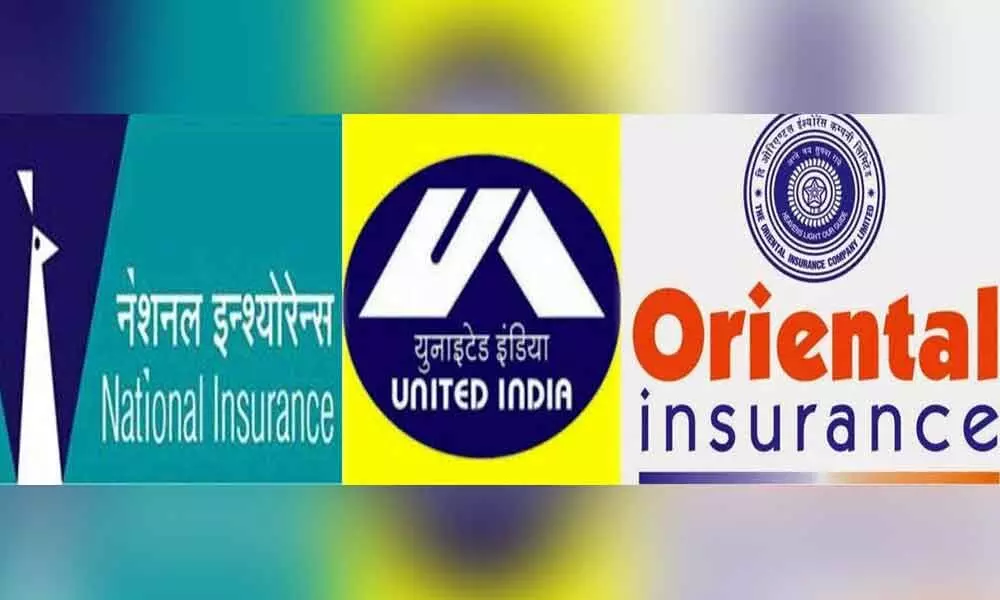Live
- Mercedes-Benz India to Launch 8 New Models, Focus on EVs in 2025
- Collector Inspects EVM Godown in Nagarkurnool
- Devotees' Tragic Demise in Tirumala Stampede: Chakravarthy Acharyulu Expresses Deep Condolences
- Disability can be identified and prevented in the early stages -DMHO Dr. K.V. Swarajya Lakshmi
- Ram Charan's 'Game Changer' Set for Big Box Office Debut
- Scientists Provide Training to Farmers on Integrated Farming
- SP Gaikwad Launches Feedback QR Code Poster for Police Services Opinion
- Helping Hands Charitable Trust Distributes Study Material to 3,000 Students in Gattu Mandal
- Samajwadi Party Strengthens Leadership in Telangana and Andhra Pradesh
- Poco X7 5G and Poco X7 Pro 5G Launched in India: Price, Specifications, and Features
Just In
Divestment behind scrapping of general insurers merger?


Divestment behind scrapping of general insurers merger?
Central government had in 2018 announced the plan to merge 3 public sector insurers
Chennai: While employees of the three public sector non-life insurers are baffled at the Centre's U turn by scrapping the proposal to merge them, a labour leader termed the decision as a step towards disinvestment. "The government had in 2018 announced the plan to merge three insurers - National Insurance Company, Oriental Insurance Company and United India Insurance Company. Subsequently, all the necessary steps towards the merger were taken," said K Govindan, General Secretary, General Insurance Employees All India Association.
"The government appointed EY as consultant to give recommendations on various aspects of the merger. The boards of three companies passed resolutions enabling the merger," Govindan said.
On Wednesday, the Cabinet, chaired by Prime Minister Narendra Modi, approved the Rs 12,450 crore capital infusion, which included Rs 2,500 crore given in FY20, in the three insurers. Of this, Rs 3,475 crore is to be infused immediately and the rest Rs 6,475 crore later.
The Cabinet also approved increase in authorised share capital of National Insurance Company to Rs 7,500 crore and that of United India and Oriental Insurance to Rs 5,000 crore each to give effect to the capital infusion.
To ensure optimum use of the new capital, it issued guidelines in the form of KPIs (key performance indicators) for raising business efficiency and profitable growth. The government also blocked the merger process and shifted the focus on their solvency and profitable growth. "There is nothing wrong in infusing capital and going ahead with merger. All employees are for merger. While in the banking sector the government went ahead with the merger despite the opposition from employees, here employees want the merger and the government is against it," Govindan said.
Perhaps, the government wants to divest its stake after capital infusion and boosting the three firms' solvency ratio. There is no other plausible reason for the U turn, he said.
He also fears the unhealthy under-cutting of the premium rates would continue between them, defeating the rationale of capital infusion.
Agreeing with Govindan on divestment, a senior industry official said, "May be the government is not going ahead with the merger of insurers. It may go for divestment after beefing up their solvency margins."
A former Chairman-cum-Managing Director of a PSU non-life insurer said, "Merger of insurance companies are not as easy as that of companies in other sectors. While adding up of assets of the merger candidates is easy, to arrive at a valuation, which is basically actuarial calculations, is the difficult task." According to him, the merged entity may not get an attractive valuation against valuation on the standalone basis. "Even if the three companies are merged the solvency ratio would not increase, necessitating capital infusion," he said.
According to him, the merger announcement in 2018 had surprised the players, calling off of the merger is not a surprise as the situation has changed.
Industry officials also recalled Finance Minister Nirmala Sitharaman's announcement in May that the government would come out with a public sector enterprise (PSE) policy for a new and self-reliant India.
Sitharaman said the government would notify the strategic sectors requiring presence of PSEs. There would be at least one PSE in the strategic sector, she said. In other sectors, the PSEs would be privatised, she added. "To minimise wasteful administrative costs, number of enterprises in strategic sectors will ordinarily be only one to four; others will be privatised/ merged/brought under holding companies," Sitharaman said.

© 2025 Hyderabad Media House Limited/The Hans India. All rights reserved. Powered by hocalwire.com






